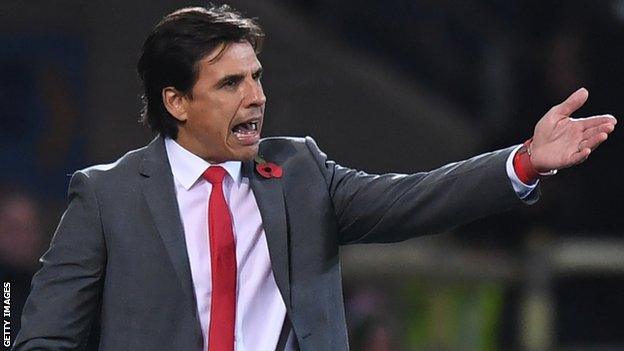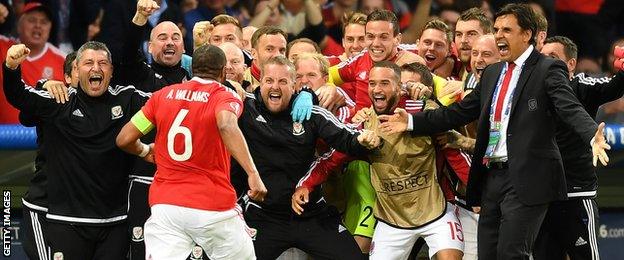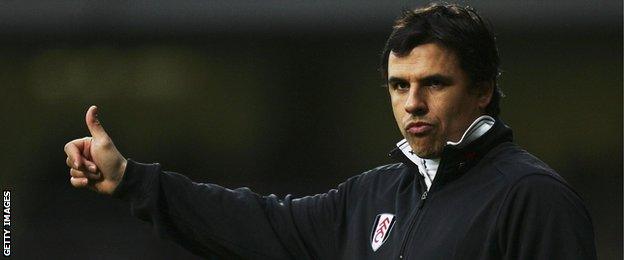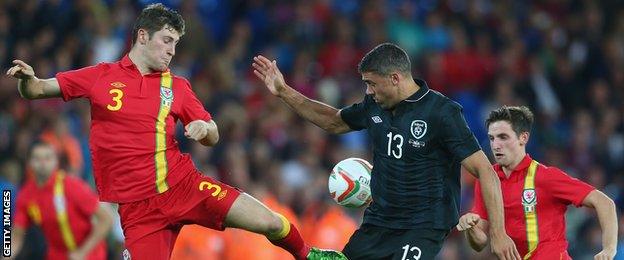Republic of Ireland v Wales: Chris Coleman remembers his Irish father
- Published

Chris Coleman succeeded the late Gary Speed as Wales manager in 2012
World Cup qualifier: Republic of Ireland v Wales |
|---|
Venue: Aviva Stadium, Dublin Date: Friday, 24 March Kick-off: 19:45 GMT |
Coverage: Live on BBC Radio Wales, BBC Radio Cymru & BBC Sport website and BBC Sport app, plus live text commentary |
When Wales make their way to the Aviva Stadium for their World Cup qualifier against Ireland on Friday, Dublin's landmarks will probably pass the players by as they focus on the task ahead, oblivious to the sound and fury around them.
For their manager Chris Coleman, however, the sight of the River Liffey will be an opportunity for a fleeting moment of reflection.
This is where Coleman scattered the ashes of his late father, Paddy, three years ago; dropping them into the water along with a pint of Guinness, as is tradition.
Born and bred in Dublin before moving to Swansea at the age of 20, Paddy had requested that his ashes be sprinkled into the river in this manner.
And although Coleman will not be returning to that very spot on this occasion, even as he prepares Friday's enormous match, he will carry the memory of his father.
"We did it outside the Brazen Head pub next to the River Liffey, which is the oldest pub in Dublin," Coleman says.
"It dates back to 1198 and the history is incredible, unbelievable. I thought it was poignant.
"I used to take him back most summers for a few days. He would have a little roam around where he was brought up.
"He always said make sure you do it there. It was his request. The Guinness into the Liffey is a done thing there, especially where he is from.
"You throw a pint of Guinness into the Liffey. If I'm honest with you I did have a little drop first - it was eight Euros a pint!"
Wales boss Coleman's Irish connection
Coleman bursts into laughter at this point, a broad smile unfurling across his face as he regales the room with tales of his father.
With still a few days before the match, he can afford to relax.
But when he is asked if he will return to the same spot this week, even the raconteur in Coleman makes way for solemn professionalism.
"No, it's not a friendly visit. I won't be thinking about anything else," he says.
"I will think about my father because it's his city and he would have wanted us to do well."
Coleman will not allow emotion to distract him, but he is a master of harnessing strong feelings and channelling them into his team's performances.
While leading his country to the uncharted territory of the Euro 2016 semi-finals, the 46-year-old spoke with statesmanlike grandeur - urging a nation "not to be afraid to dream" - as well as striking candour in his admission of having endured "more failures than success".

Chris Coleman was shortlisted for the Fifa coach of the year award after Wales' Euro 2016 exploits
Those five weeks in France were the greatest of Coleman's career, but his one regret was that he was unable to share the moment with his father.
Paddy had died at the age of 74 two years before the tournament, and Coleman said in France how dearly he wished his father could have seen the success, having watched his son toil in previous years.
While Coleman's father was alive, Wales finished their 2014 World Cup qualifying campaign second from bottom of their group, languishing as low as 82nd in the world rankings.
They are a side transformed now, qualifying for their first major tournament since the 1958 World Cup and exceeding all expectations by reaching the last four in France.
A call from Jack Charlton
It might have been a different tale for Coleman, whose Dublin roots could have seen him represent the Republic of Ireland rather than Wales.
So did Paddy ever want his son to play for his homeland?
"No, he never ever did," Coleman says.
"He always pushed me to play for Wales Under-15s in my day. If you had shown a bit of talent then you would play for south Wales. You would play against north Wales. It was all about playing for Wales.
"There was talk about it when Jackie Charlton was manager of the Republic and there was a tentative phone call that came my way. But he [Paddy] was always Wales."
It proved to be sage advice as Coleman accumulated 32 caps at centre-back for Wales, albeit in a career cut short by injury.
The positive effect of a premature end to his playing days was an early introduction to management, becoming the youngest man to take charge of a Premier League team when he succeeded Jean Tigana at Fulham at the age of 32 in 2003.

Chris Coleman spent five years at Fulham as a player before becoming the Cottagers' manager
Coleman's journey to the pinnacle of Welsh football has been a tempestuous one at times - between Fulham and Wales, his stints at Real Sociedad, Coventry and Greek club Larissa were short-lived - but that turbulence has made the recent success sweeter.
And it was his father who first set Coleman on the path to this point.
"He was a huge football man, he loved football. He was a good parent, a great father. Like any normal parent. He was brilliant with me," he says.
"I started playing football at seven and he was one of those who never raised his voice. He guided me.
"I watched parents sometimes on the touchlines at youth games and they are screaming and shouting which is not the way to go.
"But he was the opposite of that. He was always a quiet talker, but he was massive for me as a youngster coming through.

Chris Coleman's Wales side drew 0-0 with the Republic of Ireland in a 2013 friendly
"It was huge. I wouldn't have got to different levels I got to without his guidance. He was brilliant, fantastic.
"He lived in Swansea for 50 years, he still had his Dublin accent and never changed.
"Unfortunately for him it was going wrong for me with Wales so he never got to see us at the tournament. I was very close to him."
It is clear Coleman will have Paddy on his mind in Dublin, as will his mother, Eileen, and sisters, Beverley and Joanna.
The memory of his father will live long in his homeland, not only in the Liffey but in the city's famous Temple Bar area, where his brother Michael, an artist, resides.
And once Wales' match has finished, Coleman will afford himself more than just a sip of Guinness.
"I'll have a pint after the game definitely, and that will be remembering him," he says.
"But beforehand it will be business."